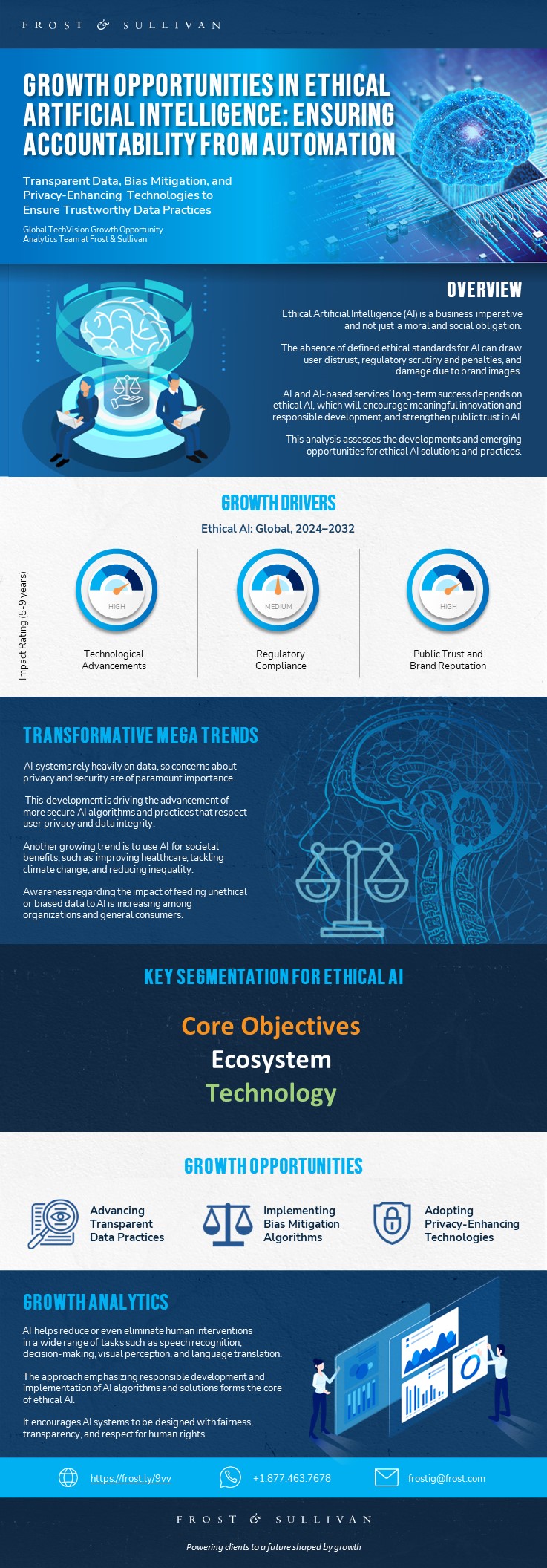Ethical AI: Ensuring Accountability from Automation
Ethical AI: Ensuring Accountability from Automation
Transparent data, bias mitigation, and privacy-enhancing technologies to ensure trustworthy data practices
12-Dec-2023
Global
Technology Research
Description
Artificial Intelligence (AI) helps reduce or even eliminate human interventions in a wide range of tasks such as speech recognition, decision-making, visual perception, and language translation. AI technologies are increasingly integrated into daily lives, and its influence is growingly visible across various industries.
The approach emphasizing on responsible development and implementation of AI algorithms and solutions forms the core of ethical AI. It encourages AI systems to be designed with fairness, transparency, and respect for human rights. It also addresses data privacy issues and algorithmic bias, including other social risk factors arising from AI deployment.
Ethical AI is a business imperative and not just a moral and social obligation. The absence of defined ethical standards for AI can draw user distrust, regulatory scrutiny and penalties, and damage due to brand images. AI and AI-based services’ long-term success depends on ethical AI, which will encourage meaningful innovation and responsible development, and strengthen public trust in AI.
The ‘Ethical AI: Ensuring Accountability from Automation’ assesses the current developments and emerging opportunities for ethical AI solutions and practices. The report covers the following topics:
• An introduction to ethical AI
• Factors influencing development and adoption--drivers and challenges
• Technological developments
• Industry impact
• Regulatory landscape
• Growth opportunities
RESEARCH: INFOGRAPHIC
This infographic presents a brief overview of the research, and highlights the key topics discussed in it.Click image to view it in full size

Table of Contents
Why Is It Increasingly Difficult to Grow?The Strategic Imperative 8™: Factors Creating Pressure on Growth
The Strategic Imperative 8™
The Impact of the Top 3 Strategic Imperatives on Ethical AI Technology and Practices
Growth Opportunities Fuel the Growth Pipeline Engine™
Research Methodology
Scope of Analysis
Segmentation
Growth Drivers
Growth Restraints
Technology Attractiveness Dashboard
Technology Attractiveness Dashboard (continued)
Technology Attractiveness Dashboard (continued)
Evolution of AI
Need for Ethics in AI
Ethics in AI—Key Pain Points to Consider
Ethics in AI—Key Pain Points to Consider (continued)
Examples of AI Implementation
Industry Impact
Industry Impact (continued)
Technological Developments and Initiatives
Technological Developments and Initiatives (continued)
Technological Developments and Initiatives (continued)
Regulatory Landscape and Proposed Policies
Model for Development and Implementation of Ethical AI Systems
Growth Opportunity 1: Advancing Transparent Data Practices
Growth Opportunity 1: Advancing Transparent Data Practices (continued)
Growth Opportunity 2: Implementing Bias Mitigation Algorithms
Growth Opportunity 2: Implementing Bias Mitigation Algorithms (continued)
Growth Opportunity 3: Adopting Privacy-enhancing Technologies
Growth Opportunity 3: Adopting Privacy-enhancing Technologies (continued)
Technology Readiness Levels (TRL): Explanation
Your Next Steps
Why Frost, Why Now?
Legal Disclaimer
Popular Topics
| Deliverable Type | Technology Research |
|---|---|
| Author | soumyadeep chowdhury |
| Industries | Information Technology |
| No Index | No |
| Is Prebook | No |
| Keyword 1 | Automation Ethics Trends |
| Keyword 2 | Ethical AI Best Practices |
| Keyword 3 | Regulatory Compliance in AI |
| Podcast | No |
| WIP Number | DAC7-01-00-00-00 |